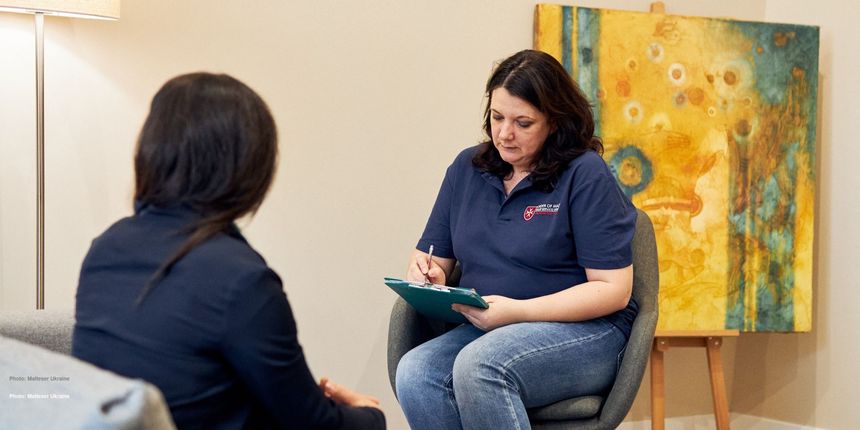
“My home has turned into a place of horror”: Voices from Ukraine
We at Malteser International have been supporting the people affected by the consequences of the war in Ukraine since before the beginning of the countrywide conflict. Together with our partner organizations Malteser Ukraine, Mental Health Service (MHS) and Words Help we placed a focus on mental health and psychosocial support, especially since the full-scale invasion in February 2022. In the last years, the focus of your assistance in this area has shifted together with the issues our specialists are approached with – from supporting people who lost their homes and were forced to find refuge in other parts of Ukraine, to topics like depression, grief, apathy, inability to plan, emotional exhaustion, and a general uncertainty that keeps increasing the longer the war continues.
Coping with pain and rage
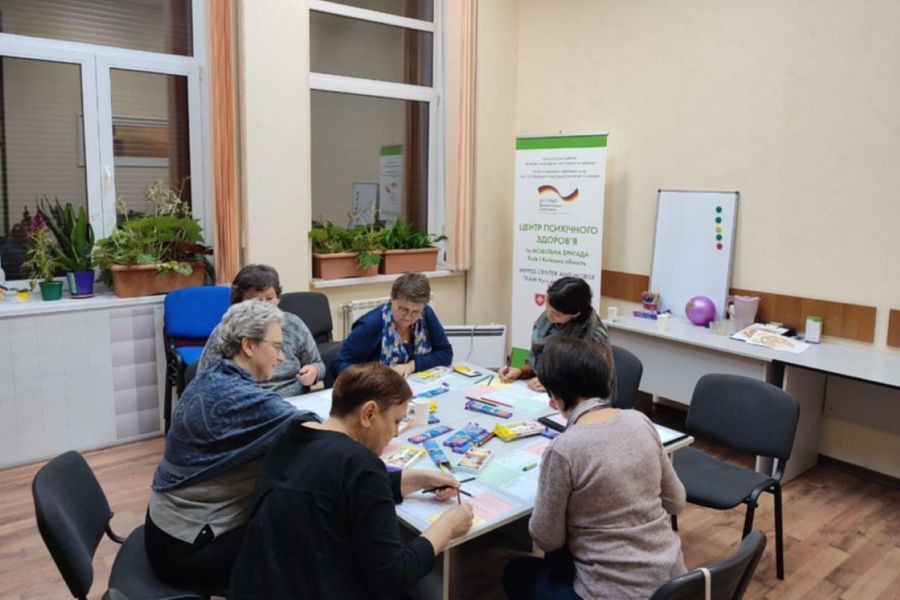
Liliya is 50 years old and used to live in Mariupol. Before the war, her hometown was a beautiful city by the Sea of Azov, an economic and university centre with an important harbour. From March to May 2022, Mariupol made the news due to the heavy fighting and massive destruction that occurred there, resulting in a major humanitarian crisis and massive flight movement. From the original population of 440,000, only a third remained in the city under control by the Russian forces. (source: ZDF)
Like tens of thousands of others, Liliya’s husband died during the attacks. Together with her children, Liliya was able to flee to Kyiv. “My beloved Mariupol has turned into a place of horror, pain, destruction and crushed dreams. I looked at the ruins of my house, petrified. Powerlessness ... Total apathy ... Pain and rage ...” Once arrived in Kyiv, instead of the expected relief, Liliya’s painful memories began to torment her. Difficulties in adapting to the new environment, grief over the loss of her husband and constant fear for the future of her children deeply affected her mental state.
In addition, the people in Kyiv, too, experience frequent missile attacks, air raid alerts, and power blackouts since the nationwide war began. Unable to endure it, Liliya had decided to give up and seek refuge abroad, when acquaintances recommended her to contact the centre for mental health and psychosocial support in Kyiv run by our partner organization Mental Health Service. The specialists in the centre supported her with various measures for psychological recovery and introduced her to stress management techniques. After some time, Liliya could sleep again without nightmares, learned to cope with her terrible memories, felt less anxiety and made new social contacts. She decided to stay in Kyiv and settle into her new life in the best way possible while supporting her children to do the same.
Every child in Ukraine is affected
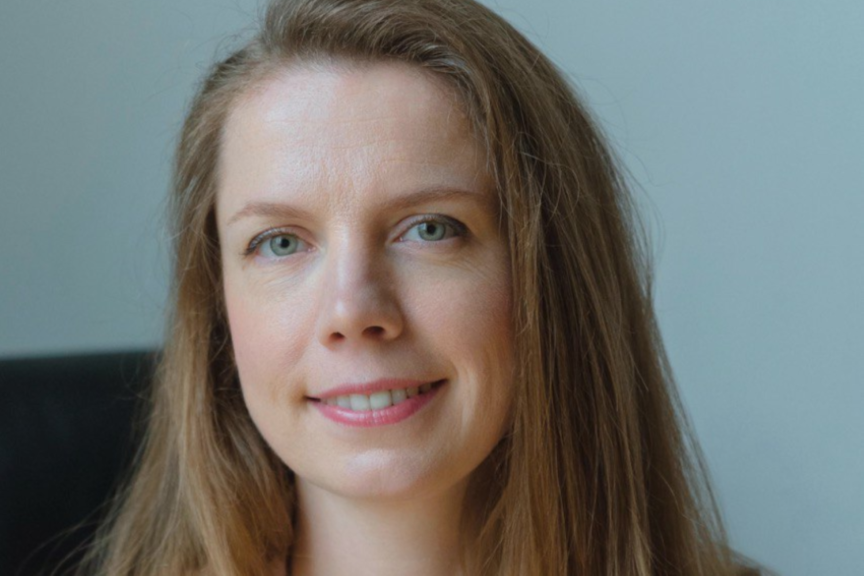
The children in Ukraine face numerous challenges: Many of them are displaced and must integrate into a whole new environment, including school where some children are displaced, some are local, some have parents at home, some at war and some student’s parents have, unfortunately, been killed – the different family situations often resulting in stress and conflict.
Adding to this, they need to deal with the day-to-day consequences of the war: “Almost every day, there is an air raid alert and students stop studying and spend hours in bomb shelters. Some of them cope with their emotions, while others experience anxiety. Unfortunately, there are no children left in Ukraine who have not suffered from the war. And this topic is becoming more and more acute and relevant now," explains Khrystyna Halushchak, head of the Malteser Ukraine Centre for Psychological Support and Counselling in Lviv in Western Ukraine.
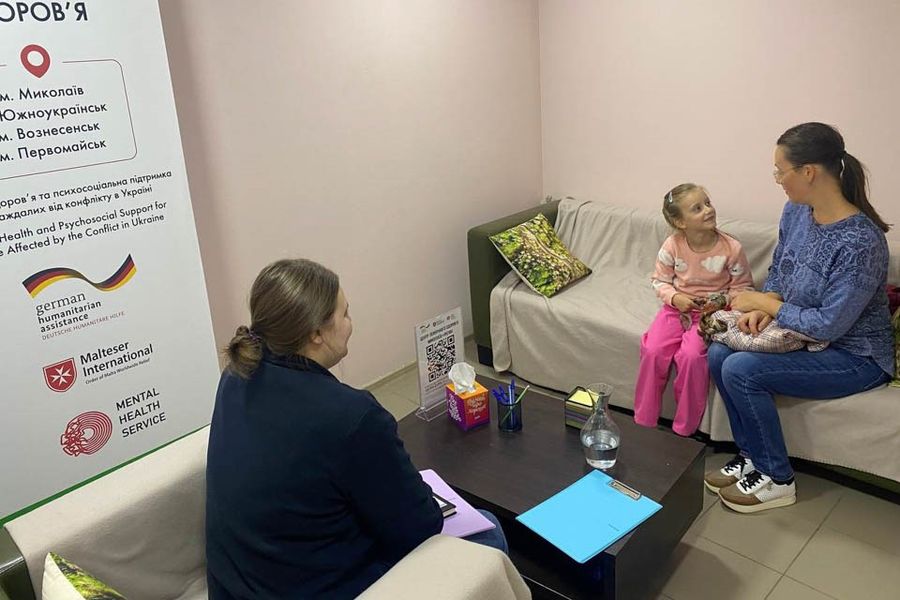
To support children and adolescents, the centre's specialists have been actively working in educational institutions since the beginning of the war. "In our work with children, particularly in schools, we conduct psycho-educational activities and teach students how to regulate their stress. We explain that having anxiety, a depressed mood or some unusual changes in emotions is not something that should be pushed away, but something that should be treated with care and paid attention to. We teach high school students body-oriented practices aimed at regulating their psycho-emotional state, because a lot of stress accumulates in the body," says psychologist Olena Romanova.
Children can also visit such centres with their parents for individual counselling, like Veronika, 36, who was forced to flee from the highly contested city Bakhmut, together with her family. Her daughter was nine years old when they sought counselling with the specialists from our partner Mental Health Service after their arrival in Kyiv.
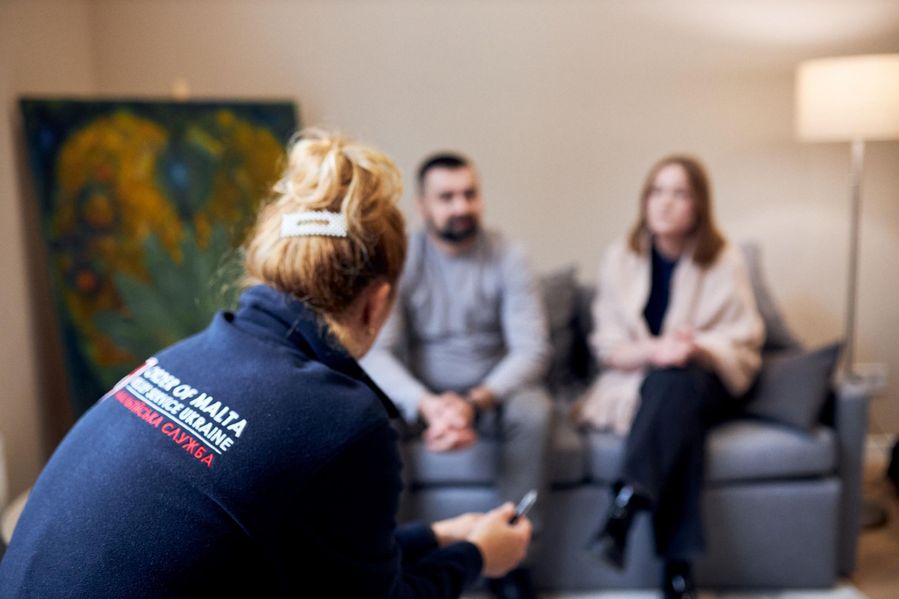
She says, “My daughter and I visit the centre together. Thank you to the psychologists who helped my child cope with the consequences of war. My daughter was under constant stress and felt depressed, but now she sleeps peacefully, no longer sobs at night, her aggression has disappeared, she started making friends here and playing with peers.”
Olena Beredina, coordinator of psychologists at Malteser Ukraine’s center in Kharkiv, explains what happens after a trauma like the sudden loss of a loved one or your home: "Of course, the world will not be the same for us, it will be different now. The shock passes, and after a while a sense of reality sets in. And it is very important who will be there for you in this reality, so that you start to feel the thirst for life again. I remember a case when a mother and daughter came together for a consultation. It turned out that the daughter's boyfriend had been killed in a bombing. The girl was mourning the loss of a loved one, it was a long process of grieving. For her, the mother became the person who was there for her during her mourning. And for me, as a psychologist, it was important to take care of both of them, to spend this piece of life with them, so that later each of them could go on on their own."
Every day, Ukrainian families go through difficult trials: an increasing number of cases of former combatants returning home with post-traumatic stress syndrome burden the families. Psychoeducation plays an important role here, too. "When working with couples,” explains Teresa Gevko, a psychologist working for Malteser Ukraine, "I believe it is necessary to tell them what kind of symptoms they will face. Why does a person behave this way when they return from war? What does it mean for them? How long will it last? Conveying and explaining this information over time often stops young people from making rash decisions."
Regaining hope and strength
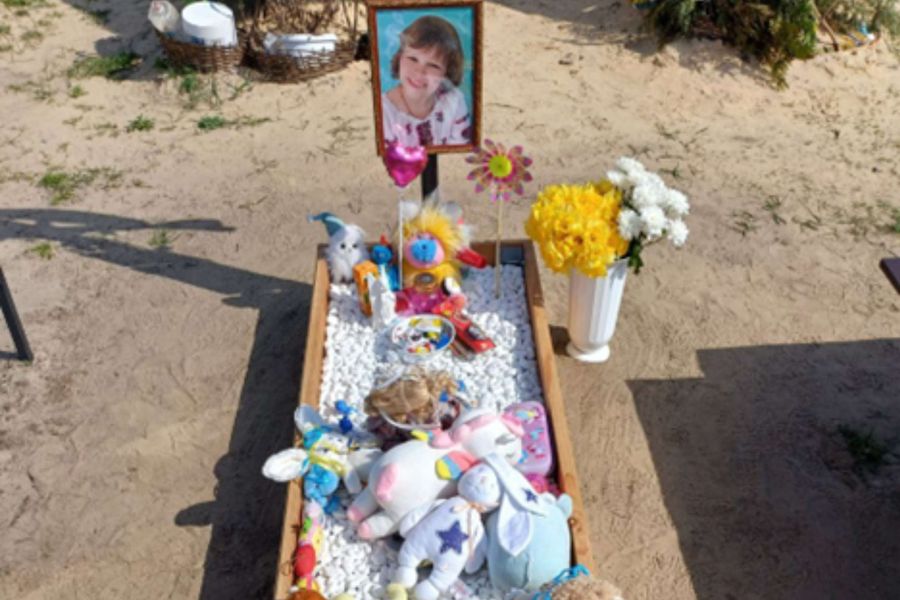
Last summer, 36-year-old Olga from Kyiv lost her 6-year-old daughter Sophia during a shelling in broad daylight, while taking a walk.
“A month after the tragedy, I started working with a psychologist”, she says. “This support was very important to me. I felt that I was not alone, that there was a person who shared my grief, with whom I could talk about it. I was gradually recovering, calming down, learning to take care of myself, and realizing that grieving is a normal process.”
Together with our partners, we have already supported almost 100.000 people with mental health and psychosocial support. It is clear, however, that our work will not stop, but can only really begin when the war comes to an end. The daily consequences of war are an ongoing traumatic situation, so it is almost impossible to process and heal trauma as long as the war continues. In the meantime, we at MI and our highly valued partners continue efforts to prevent the worsening of the situation. We stand by the Ukrainian people – as long as it takes.
(August 2024)








